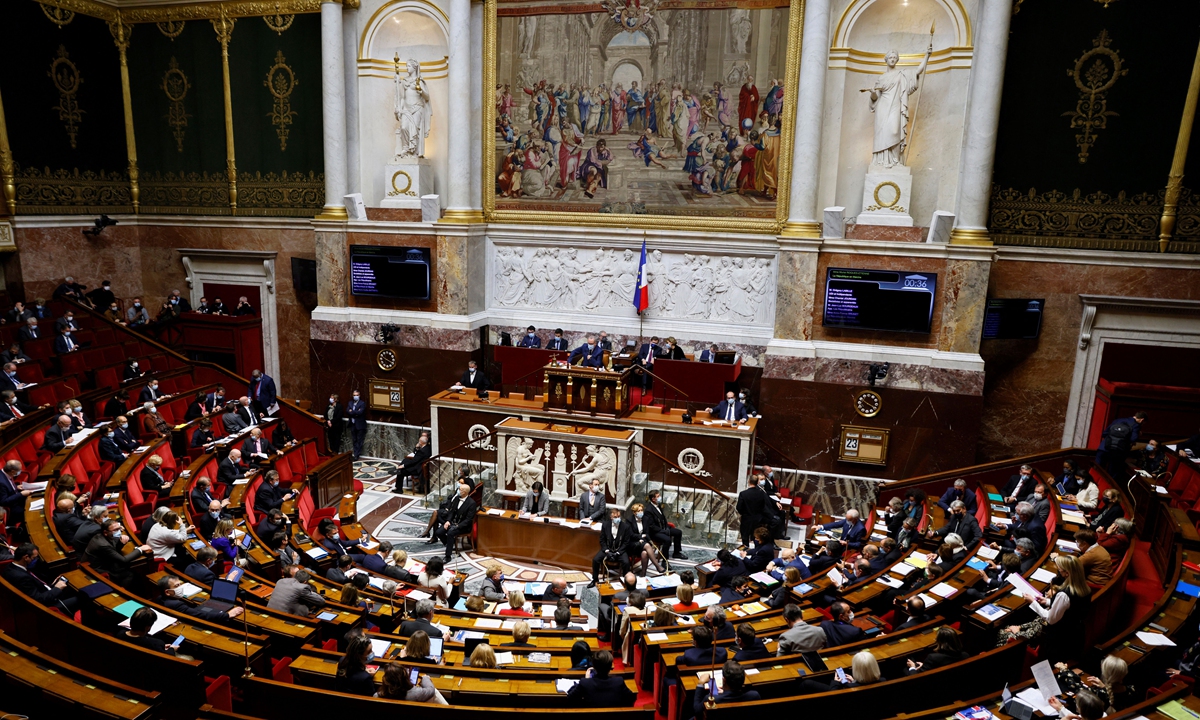
A general view shows a session of questions to the government at The National Assembly in Paris on November 23, 2021. Photo: AFP
The French National Assembly on Monday adopted a resolution supporting the participation of the island of Taiwan in international forums, according to media reports. For a major power like France, any decision arises not out of a sole cause, but out of comprehensive consideration and careful calculation.First, Lithuania has repeatedly touched China's red line regarding the Taiwan question. As a response, China decided to downgrade its diplomatic ties with Lithuania to the level of chargé d'affaires. As Lithuania is a member state of the EU, France, being a major power of the bloc, needs to make some gesture to show the EU's unity.
Second, by playing the Taiwan card, France tries to test China's bottom line, and pile pressure on China, in an attempt to gain advantages when negotiating with China.
Third, the island of Taiwan has performed well in the semiconductor industry. It's likely France also hopes to gain some economic benefits by showing some support to the island.
Fourth, France's provocation over China on the Taiwan question is also influenced by the US. Paris still has to take into account the views of Washington when it comes to major decisions.
Furthermore, the next French presidential election is scheduled to be held in April 2022. President Emmanuel Macron therefore tends now to strike a high diplomatic profile. In addition, France will take the rotating Council of the European Union presidency in the first half of 2022. Against this backdrop, France intends to make some gestures on sensitive issues.
The National Assembly now has expressed support to the Taiwan island, but it is anticipated that neither the French president nor the prime minister will echo it. France is engaging in a careful political game. If China expresses dissatisfaction toward the move, the French government can pass the buck to the National Assembly. This can give Paris more flexible room to deal with China.
Besides, France is different from Lithuania. The three Baltic countries have very little economic dependence on China. They rely on the EU when it comes to politics and on NATO in terms of security. They believe tightly clinging to the US could bring more benefits. But France has its own calculations. It has close economic ties, as well as multiple political cooperation with China. If France steps on the red line of the Taiwan question, provokes China, it will suffer more losses than gains. Paris is hoping to maximize its interests through a so-called resolution. But it will try hard to avoid huge losses for this resolution. Those politicians are shrewd in this regard.
In October, a delegation from the French Senate visited Taiwan. For those senators, making rash moves on the Taiwan question is aimed at catching attention, winning votes and personal political gains.
There is a negative trend in Europe whereby the political arena is getting fragmented. Radical small political parties are emerging. Under such circumstance, it is hard to form a unified position.
In order to boost their own strength, those small parties keep raising their voices, making the political environment more and more polarized. As a result, politicians even sacrifice their national interests for the sake of their own parties' policies and interests.
Many European people are very clear about what the Taiwan question means to China. But certain politicians would still do irrational, incorrect things, hyping up a radical mentality for their survival.
The new German government has been established. France will go though its general election next year. Political fragmentation in Europe may become more and more severe. Countries in the continent once hoped they would have a united single voice toward the outside world, but it will only become harder to achieve consensus. This will be bound to affect the stability of the EU's foreign policy, including its China policy. In years to come, the EU's China policy may witness a period of adjustments.
One cannot overlook considerable benefits in cooperation between China and Europe. But competition between the two sides is also getting fiercer. European people are increasingly focusing on the competition. Partly due to instigation from the US, the vigilance of the entire Western world toward China is on the rise.
Against this background, it may be difficult for China-EU relations to have a grand cooperation and take big strides forward. When the two sides interact with each other in years to come, they should manage competition, differences and frictions properly while cooperating. Both parties should find a suitable path of getting along amid cooperation and competition.
The author is a professor at the School of International Relations of Beijing Foreign Studies University. opinion@globaltimes.com.cn

